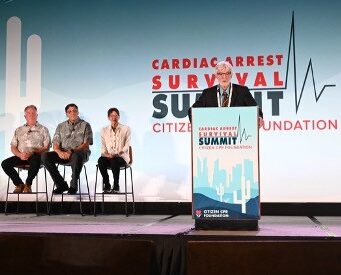Stu Berger, MD, Citizen CPR Foundation President, shares the following summary of “Defibrillation Strategies for Refractory Ventricular Fibrillation,” recently published in the New England Journal of Medicine:
Outcomes from sudden cardiac arrest have improved over the years as a result of technological advances in defibrillation techniques and technology. Other interventions that have included community CPR-AED education have also proved to be beneficial. However, shock-refractory ventricular fibrillation (VF) is not uncommon during out-of-hospital-cardiac-arrest (OHCA). This study offers an important discussion of exciting alternatives to shock strategies when conventional approaches fail.
In a randomized-controlled study reported by Cheskes et al. in the New England Journal of Medicine in November 2022, double sequential external defibrillation (rapid sequential shocks from two defibrillators) and vector-change defibrillation (switching defibrillator pads to the anterior-posterior position) have been proposed as techniques to improve outcomes.
In this study, 405 patients were enrolled with a total of 136 (33.6%) receiving standard defibrillation, 144 (35.6%) receiving vector-change defibrillation, and 125 (30.9%) receiving double-sequential external defibrillation. Of importance is the fact that survival to hospital discharge was more common in the double-sequential external defibrillation group than in the standard group (30.4% vs. 13.3%) and more common in the vector-change group than in the standard group (21.7% vs. 13.3%). Double-sequential external defibrillation was associated with a higher recovery of patients having a good neurologic outcome than standard defibrillation.
This paper offers an exciting possibility for improved outcomes by the employment of alternative methods for defibrillation in heretofore shock-refractory VF. Although the logistics of having a second defibrillator present and available might be challenging, the use of vector-change defibrillation with single defibrillator systems might be an alternative strategy when a second defibrillator is not available.
Although this trial was accompanied by/associated with some limitations, particularly with its institution around the time of the COVID-19 pandemic, and the operational challenges associated with that, this trial is indeed significant in that it does show that survival to hospital discharge was significantly improved with double-sequential external defibrillation and vector-change defibrillation compared to standard defibrillation in patients with shock-refractory VF during OHCA. We look forward to more data on these techniques, as well strategies for implementation. Although this is but one study, it is indeed a report of some exciting alternatives to conventional approaches and we look forward to additional studies and education with regard to implementation, if appropriate.



